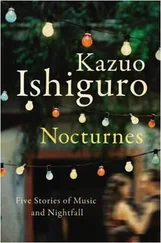“Kathy, it’s not your one. The one you lost. I tried to find it for you, but it’s really gone.”
“Yeah,” I said. “Gone to Norfolk.”
We both laughed. Then I took the tape out of the bag with a disappointed air, and I’m not sure the disappointment wasn’t still there on my face while I examined it.
I was holding something called Twenty Classic Dance Tunes . When I played it later, I discovered it was orchestra stuff for ballroom dancing. Of course, the moment she was giving it to me, I didn’t know what sort of music it was, but I did know it wasn’t anything like Judy Bridgewater. Then again, almost immediately, I saw how Ruth wasn’t to know that—how to Ruth, who didn’t know the first thing about music, this tape might easily make up for the one I’d lost. And suddenly I felt the disappointment ebbing away and being replaced by a real happiness. We didn’t do things like hug each other much at Hailsham. But I squeezed one of her hands in both mine when I thanked her. She said: “I found it at the last Sale. I just thought it’s the sort of thing you’d like.” And I said that, yes, it was exactly the sort of thing.
I still have it now. I don’t play it much because the music has nothing to do with anything. It’s an object, like a brooch or a ring, and especially now Ruth has gone, it’s become one of my most precious possessions.
I want to move on now to our last years at Hailsham. I’m talking about the period from when we were thirteen to when we left at sixteen. In my memory my life at Hailsham falls into two distinct chunks: this last era, and everything that came before. The earlier years—the ones I’ve just been telling you about—they tend to blur into each other as a kind of golden time, and when I think about them at all, even the not-so-great things, I can’t help feeling a sort of glow. But those last years feel different. They weren’t unhappy exactly—I’ve got plenty of memories I treasure from them—but they were more serious, and in some ways darker. Maybe I’ve exaggerated it in my mind, but I’ve got an impression of things changing rapidly around then, like day moving into night.
That talk with Tommy beside the pond: I think of it now as a kind of marker between the two eras. Not that anything significant started to happen immediately afterwards; but for me at least, that conversation was a turning point. I definitely started to look at everything differently. Where before I’d have backed away from awkward stuff, I began instead, more and more, to ask questions, if not out loud, at least within myself.
In particular, that conversation got me looking at Miss Lucy in a new light. I watched her carefully whenever I could, not just from curiosity, but because I now saw her as the most likely source of important clues. And that’s how it was, over the next year or two, I came to notice various odd little things she said or did that my friends missed altogether.
There was the time, for example, maybe a few weeks after the talk by the pond, when Miss Lucy was taking us for English. We’d been looking at some poetry, but had somehow drifted onto talking about soldiers in World War Two being kept in prison camps. One of the boys asked if the fences around the camps had been electrified, and then someone else had said how strange it must have been, living in a place like that, where you could commit suicide any time you liked just by touching a fence. This might have been intended as a serious point, but the rest of us thought it pretty funny. We were all laughing and talking at once, and then Laura—typical of her—got up on her seat and did a hysterical impersonation of someone reaching out and getting electrocuted. For a moment things got riotous, with everyone shouting and mimicking touching electric fences.
I went on watching Miss Lucy through all this and I could see, just for a second, a ghostly expression come over her face as she watched the class in front of her. Then—I kept watching carefully—she pulled herself together, smiled and said: “It’s just as well the fences at Hailsham aren’t electrified. You get terrible accidents sometimes.”
She said this quite softly, and because people were still shouting, she was more or less drowned out. But I heard her clearly enough. “You get terrible accidents sometimes.” What accidents? Where? But no one picked her up on it, and we went back to discussing our poem.
There were other little incidents like that, and before long I came to see Miss Lucy as being not quite like the other guardians. It’s even possible I began to realise, right back then, the nature of her worries and frustrations. But that’s probably going too far; chances are, at the time, I noticed all these things without knowing what on earth to make of them. And if these incidents now seem full of significance and all of a piece, it’s probably because I’m looking at them in the light of what came later—particularly what happened that day at the pavilion while we were sheltering from the downpour.

We were fifteen by then, already into our last year at Hailsham. We’d been in the pavilion getting ready for a game of rounders. The boys were going through a phase of “enjoying” rounders in order to flirt with us, so there were over thirty of us that afternoon. The downpour had started while we were changing, and we found ourselves gathering on the veranda—which was sheltered by the pavilion roof—while we waited for it to stop. But the rain kept going, and when the last of us had emerged, the veranda was pretty crowded, with everyone milling around restlessly. I remember Laura was demonstrating to me an especially disgusting way of blowing your nose for when you really wanted to put off a boy.
Miss Lucy was the only guardian present. She was leaning over the rail at the front, peering into the rain like she was trying to see right across the playing field. I was watching her as carefully as ever in those days, and even as I was laughing at Laura, I was stealing glances at Miss Lucy’s back. I remember wondering if there wasn’t something a bit odd about her posture, the way her head was bent down just a little too far so she looked like a crouching animal waiting to pounce. And the way she was leaning forward over the rail meant drops from the overhanging gutter were only just missing her—but she seemed to show no sign of caring. I remember actually convincing myself there was nothing unusual in all this—that she was simply anxious for the rain to stop—and turning my attention back to what Laura was saying. Then a few minutes later, when I’d forgotten all about Miss Lucy and was laughing my head off at something, I suddenly realised things had gone quiet around us, and that Miss Lucy was speaking.
She was standing at the same spot as before, but she’d turned to face us now, so her back was against the rail, and the rainy sky behind her.
“No, no, I’m sorry, I’m going to have to interrupt you,” she was saying, and I could see she was talking to two boys sitting on the benches immediately in front of her. Her voice wasn’t exactly strange, but she was speaking very loudly, in the sort of voice she’d use to announce something to the lot of us, and that was why we’d all gone quiet. “No, Peter, I’m going to have to stop you. I can’t listen to you any more and keep silent.”
Then she raised her gaze to include the rest of us and took a deep breath. “All right, you can hear this, it’s for all of you. It’s time someone spelt it out.”
We waited while she kept staring at us. Later, some people said they’d thought she was going to give us a big telling-off; others that she was about to announce a new rule on how we played rounders. But I knew before she said another word it would be something more.
Читать дальше













